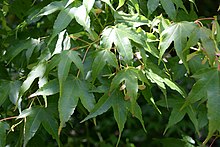Acer sinense: Difference between revisions
No edit summary |
m fix typo |
||
| (19 intermediate revisions by 4 users not shown) | |||
| Line 4: | Line 4: | ||
|image_caption=''Acer sinense'' in [[Christchurch Botanic Gardens]] |
|image_caption=''Acer sinense'' in [[Christchurch Botanic Gardens]] |
||
|genus=Acer |
|genus=Acer |
||
|display_parents=2 |
|||
|parent=Acer ser. Palmata |
|||
|species=sinense |
|species=sinense |
||
|authority=[[Ferdinand Albin Pax|Pax]]<ref>Hooker's Icon. Pl. 19: t. 1897 (1889)</ref> |
|authority=[[Ferdinand Albin Pax|Pax]]<ref>Hooker's Icon. Pl. 19: t. 1897 (1889)</ref> |
||
| Line 18: | Line 20: | ||
}}}} |
}}}} |
||
'''''Acer sinense''''' is a species of flowering plant in the genus ''[[Maple|Acer]]'', native to southeast and south-central China.<ref name="781512-1" >{{cite web |url=http://powo.science.kew.org/taxon/urn:lsid:ipni.org:names:781512-1 |title=''Acer sinense'' Pax |author=<!--Not stated--> |date=2017 |website=Plants of the World Online |publisher=Board of Trustees of the Royal Botanic Gardens, Kew |access-date=19 November 2020 }}</ref> |
'''''Acer sinense''''' is a species of flowering plant in the maple genus ''[[Maple|Acer]]'', native to southeast and south-central China.<ref name="781512-1" >{{cite web |url=http://powo.science.kew.org/taxon/urn:lsid:ipni.org:names:781512-1 |title=''Acer sinense'' Pax |author=<!--Not stated--> |date=2017 |website=Plants of the World Online |publisher=Board of Trustees of the Royal Botanic Gardens, Kew |access-date=19 November 2020 }}</ref> A small (typically 3 to 5{{nbsp}}m tall) tree rarely reaching 15{{nbsp}}m, it prefers to grow in forested valleys 500 to 2500{{nbsp}}m above sea level.<ref>{{cite web |url=http://www.efloras.org/florataxon.aspx?flora_id=2&taxon_id=200013102 |title=中华枫 zhong hua feng |author=<!--Not stated--> |date= |website=Flora of China |publisher=efloras.org |access-date=19 November 2020 }}</ref> |
||
It is a highly morphologically variable species, leading to some taxonomic confusion. Some authorities consider it to be a subspecies of Campbell's maple, ''[[Acer campbellii]]'' subsp. ''sinense'', but this is incorrect; it is in its own [[species complex]].<ref name = "Eom key" >{{cite journal |last1=Eom |first1=Hyun Joo |last2=de Jong |first2=Piet C. |last3=Chang |first3=Chin-Sung |date=December 2011 |title=A reappraisal of the ''Acer wilsonii'' complex and Related Species in China |url=https://www.koreascience.or.kr/article/JAKO201107752608421.pdf |journal=Korean Journal of Plant Taxonomy |volume=41 |issue=4 |pages=329–337 |doi=10.11110/kjpt.2011.41.4.329 |access-date=19 November 2020 |quote=key … based on the number of leaf lobes: 3-lobed (''A. wilsonii'' coml[p]ex), 5-lobed (''A. sinense'' complex), and 7-lobed taxa (''A. campbellii'' complex) }}</ref> Good traits to distinguish it from members of the ''[[Acer wilsonii]]'' species complex are that its inflorescence is a compound corymbose panicle with 60 to 70 flowers, with pedicels that are 5 to 6 mm long, its ovaries are pilose, appearing white, and its nutlet is nearly glabrous, and convex, without any veins.<ref name = "Eom key" /> |
|||
==References== |
==References== |
||
Latest revision as of 08:09, 20 October 2022
| Acer sinense | |
|---|---|

| |
| Acer sinense in Christchurch Botanic Gardens | |
| Scientific classification | |
| Kingdom: | Plantae |
| Clade: | Tracheophytes |
| Clade: | Angiosperms |
| Clade: | Eudicots |
| Clade: | Rosids |
| Order: | Sapindales |
| Family: | Sapindaceae |
| Genus: | Acer |
| Section: | Acer sect. Palmata |
| Series: | Acer ser. Palmata |
| Species: | A. sinense
|
| Binomial name | |
| Acer sinense | |
| Synonyms[2] | |
|
List
| |
Acer sinense is a species of flowering plant in the maple genus Acer, native to southeast and south-central China.[2] A small (typically 3 to 5 m tall) tree rarely reaching 15 m, it prefers to grow in forested valleys 500 to 2500 m above sea level.[3]
It is a highly morphologically variable species, leading to some taxonomic confusion. Some authorities consider it to be a subspecies of Campbell's maple, Acer campbellii subsp. sinense, but this is incorrect; it is in its own species complex.[4] Good traits to distinguish it from members of the Acer wilsonii species complex are that its inflorescence is a compound corymbose panicle with 60 to 70 flowers, with pedicels that are 5 to 6 mm long, its ovaries are pilose, appearing white, and its nutlet is nearly glabrous, and convex, without any veins.[4]
References[edit]
- ^ Hooker's Icon. Pl. 19: t. 1897 (1889)
- ^ a b "Acer sinense Pax". Plants of the World Online. Board of Trustees of the Royal Botanic Gardens, Kew. 2017. Retrieved 19 November 2020.
- ^ "中华枫 zhong hua feng". Flora of China. efloras.org. Retrieved 19 November 2020.
- ^ a b Eom, Hyun Joo; de Jong, Piet C.; Chang, Chin-Sung (December 2011). "A reappraisal of the Acer wilsonii complex and Related Species in China" (PDF). Korean Journal of Plant Taxonomy. 41 (4): 329–337. doi:10.11110/kjpt.2011.41.4.329. Retrieved 19 November 2020.
key … based on the number of leaf lobes: 3-lobed (A. wilsonii coml[p]ex), 5-lobed (A. sinense complex), and 7-lobed taxa (A. campbellii complex)
